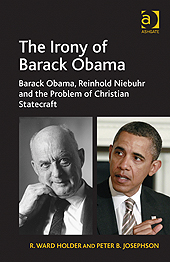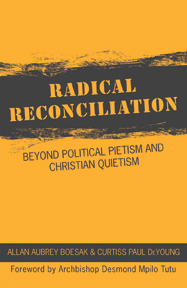
The Book of Esther understands well the challenges of living in a world where one might have to juggle and negotiate different, even conflicting, identities and loyalties– one political, one ethnic and religious. But it is interesting that while these identities are sometimes open and sometimes undisclosed, they never correspond neatly to the categories of “public” political lives vs. “private” religious lives. Esther’s hidden religious identity makes claims on her public life as well as her private life…
There has to be some recognisable point of contact, a relatedness based on direct experience rather than intellectual argument before a response can reasonably be expected. “So who do you say that I am?”. No encounter, then no question and no response. This is why one of the key tasks of any form of ministry, let alone a political or public theology, must be to identify locations for encounter, those liminal spaces in which we meet the new and unfamiliar…

The state is in crisis in an increasingly globalized world. Christians are called to a post-Constantinian engagement with the political order, embodying an incarnational practice that engages with the local context of believers and an eschatological vision focused on the full flourishing of all humanity and all of creation.

Jesus is our model for ethical, powerful speech. As we immerse ourselves in the Jesus community, and recognize that much of what passes for legitimate, “free speech” in our culture, is actually not coming out of community at all, but coming out of a place of isolation and alienation. Or, perhaps, coming out of an anti-Kingdom community, a community being formed by values opposed to the kingdom that Jesus proclaimed.

The Middle East has erupted in series of violent protests, with one in Libya killing four U.S. nationals, including the American ambassador. The media as well as some the protesters claim that the protests were precipitated by an anti-Muslim film that was originally attributed to the US (or the west more generally), but has been revealed to be produced by a Coptic Christian from Egypt. The video depicts the prophet Muhammad participating in sexual activities and announcing that he is a homosexual. The media claims that the video was created to incite Muslims and now the protesters are mistreating the US, who aided in the liberation of the Arab spring. The erroneousness of the US paternalistic narrative aside, the video is being used by the media as a tool to mythologize US imperialism in the Middle East. The video contains an allegory that disguises true forms of power and domination, cloaking it within the narrative of religious conflict….

There is no shortage of elements in Romney’s statements to investigate. In particular, his ridiculously inaccurate statements about taxes are being addressed by journalists and analysts like Ezra Klein in today’s Washington Post. But behind his statement about victimhood and the dismissal of almost half the country as dependent upon the government without any contribution to civil society is a revealing ideology of the public order that I find most disturbing.

We must guard ourselves against becoming complicit in regarding deaths of innocent Americans or Europeans abroad as being more tragic and senseless than the deaths and killings of innocent Iraqi, Afghani or Yemeni citizens. We should be expressing our outrage equally if not more, at the deaths and killings of the many men, women and children who have lost their lives violently at the hands of US and NATO forces in the ongoing illegitimate ‘wars of invasion’. Under international law those responsible for the mass killing of innocent people must be prosecuted, whether the wars are legal or not….

It seems easy. So easy we can almost brush it off. Smile approvingly at the Sunday School teacher seated across the aisle from us in worship, and check one more thing off our spiritual to-do-list. Welcome little children? Done. We might ask ourselves, “How dense could these power grubbing disciples have been to miss so simple a point as this?”
But take a look across that same aisle once again… If your church is like many, there may be an usher giving a mother a dirty look as she walks her small child to the bathroom. Or a father putting his finger to his lip, afraid that his toddler’s whispers might disrupt someone. Or maybe a middle-aged gentleman checking the church’s giving record, calculating in his head what percent of the church’s income comes from his check. Or a young woman dressed just so, glancing at a hand mirror to check her make up….

The increasing use of drone warfare under the Obama administration represents an attempt to maintain the concept of “unlawful combatant” while avoiding the publicity associated with Bush-era policies. This policy is a failed attempt to hide the modern state’s inability to adequately deal with global terrorism.

In our last post, we noted that Barack Obama was the willing victim of a particularly delicious moment of irony. The very framework that has given sophistication and moral purpose to his governing – a Niebuhrian Christian realism – could cost him the 2012 election. While Christian realism allows a statesmanlike distance between the goals that can actually be achieved and the pretensions to virtue and excellence that may be desired, very few in the American electorate wish to hear about that. In other words, to win American elections, one must be a cheerleader, or a political evangelist.
